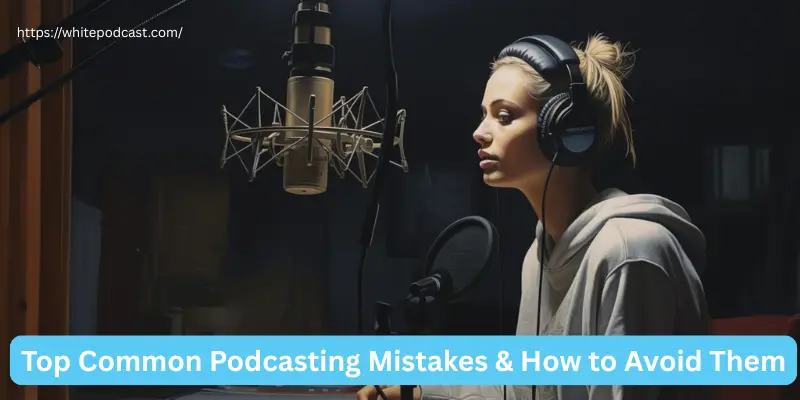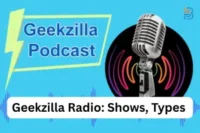Top Common Podcasting Mistakes & How to Avoid Them
Published: 3 May 2025
Podcasting is a fantastic way to share your ideas, but many beginners make avoidable mistakes that can hurt their show’s success. One of the most common blunders? Poor audio quality. In this post, we’ll explore why audio matters and how to ensure your podcast sounds professional from the start.
Starting a podcast is exciting, but many new podcasters stumble by making the same mistakes. Poor audio quality is one of the biggest culprits that can turn listeners away. In this guide, we’ll dive into common podcasting mistakes and provide actionable tips to help you improve your show.

Mistake #1: Poor Audio Quality
When it comes to podcasting, audio quality is king. If your podcast sounds muffled, echoey, or full of background noise, listeners will quickly tune out. In fact, research shows that poor audio quality is one of the top reasons why people stop listening to a podcast. As much as content matters, if your listeners can’t hear you clearly, your podcast won’t gain traction.Research
Why it Matters
A podcast is all about what your audience hears, so crystal-clear sound should be a priority. If your audio quality isn’t up to par, it distracts from your message and can even harm your podcast’s credibility. High-quality audio also reflects professionalism and shows your audience you care about their listening experience.
Solution
Invest in Good Equipment: You don’t need to buy the most expensive gear, but a quality microphone is a must. Look for microphones that are known for their clarity and durability, like the Blue Yeti or Audio-Technica AT2020.
- Use a Pop Filter: A pop filter helps eliminate those annoying popping sounds that happen when you say words with “P” or “B” in them, improving your audio quality.
- Control Background Noise: Record in a quiet, controlled environment. Avoid places with lots of echoes or background noise. You can also use soundproofing materials to reduce external noise.
- Adjust Your Levels: Ensure your audio levels are balanced—too low, and listeners will strain to hear you; too high, and your audio will distort. Use software to adjust levels before publishing.
- Test and Edit: Always test your setup before recording, and edit your podcast afterward to remove any sound issues, ensuring a polished end product. What’s the Difference Between Podcasts and Interviews?
Bonus Tip
Consider using noise reduction software like Adobe Audition or Audacity to further clean up your recordings, removing any subtle background noise or distortion.
Mistake #2: Inconsistent Upload Schedule
One of the easiest ways to lose your podcast audience is by being inconsistent with your upload schedule. When you’re just starting out, it might feel tempting to release episodes whenever you have the time or motivation. However, unpredictability in publishing can leave listeners confused or frustrated, and they might eventually lose interest.
Why it Matters
Consistency builds trust. When listeners know when to expect new content, they’re more likely to return and stay engaged with your podcast. A regular release schedule also shows professionalism and makes your podcast feel more like a serious project rather than a side hobby.
Solution
- Set a Realistic Schedule: Determine how often you can realistically release new episodes without sacrificing quality. Whether it’s weekly, bi-weekly, or monthly, make sure your schedule is something you can maintain.
- Stick to Your Plan: Once you decide on a schedule, be consistent. If you commit to releasing a new episode every Monday, for example, your audience will start to expect that content, making it a regular part of their routine.
- Use a Content Calendar: Plan your episodes ahead of time using a content calendar to ensure you stay organized and don’t miss any deadlines. This will also help prevent last-minute scrambling for content.
- Batch Recording: To help you stay consistent even during busy periods, consider batch recording multiple episodes in one sitting. This way, you always have episodes ready to go, even if you’re too busy to record in the future.
- Communicate with Your Audience: If life happens and you can’t meet your usual schedule, be transparent with your listeners. A simple post on social media or a short message in your episode can keep them informed and understanding. How to Start a Christian Podcast:
Mistake #3: Not Planning Your Content
Why This Is a Problem
If you jump into recording without a plan, your podcast can end up feeling disorganized, repetitive, or even rushed. When you’re unsure of what to talk about next, you might start rambling or lose track of your main points, which could leave your listeners bored or confused. The key to a great podcast is keeping your content on track and exciting, and that starts with a little bit of planning.
Why Planning Helps
Planning doesn’t mean scripting every word or being overly rigid. It just means taking some time to think about what you want to talk about and how to organize it. With a plan in place, you’ll feel more confident and prepared when recording, and your episodes will come out much smoother.
How to Fix It
Brainstorm Episode Ideas: Start by jotting down a list of topics you’re passionate about or that you know will interest your audience. This way, you won’t be left scrambling for ideas when it’s time to record.
- Create Simple Outlines: Before hitting record, write a quick outline of the main points you want to cover. It doesn’t have to be anything fancy—just a list of topics or bullet points to keep you on track during the episode.
- Batch Record Episodes: If you know you’ll be busy, consider recording a few episodes at once. This will give you a buffer and help keep your release schedule consistent, even if life gets in the way.
- Set a Release Plan: Having a plan for when each episode will air keeps you on track. Whether you release weekly or bi-weekly, knowing your timeline will help you stay organized and ensure you never miss a beat.
- Stay Flexible: Life happens, and sometimes things don’t go as planned—and that’s okay! Be open to adjusting your content as you go, but always have a starting point to guide you.
Mistake #4: Ignoring Audience Engagement
Engaging with your audience is key to building a loyal listener base. Responding to comments, asking for feedback, and interacting on social media helps make your podcast feel more personal and creates a community around it. When listeners feel heard, they’re more likely to stay invested in your content.
In addition to social media interaction, consider hosting Q&A sessions or using polls to let your audience influence future episodes. Showing appreciation and actively involving listeners will not only grow your audience but also keep them coming back for more.
Mistake #5: Not Editing Your Podcast
Why It’s a Problem
Many podcasters make the mistake of releasing raw, unedited content. While it’s tempting to avoid the editing process, skipping it can lead to awkward pauses, tangents, or poor pacing that can turn listeners off. A podcast with no editing can feel unprofessional and disjointed, making it harder to keep the audience’s attention.
Why Editing Matters
Editing is essential for delivering a polished and smooth listening experience. By removing unnecessary filler, background noise, or long pauses, you ensure that your message comes across clearly and engagingly. Proper editing also helps improve the pacing of the episode, making it more enjoyable for your listeners.
Solution
Trim Out the Dead Space: Cut any awkward silences or pauses where nothing is being said.
- Fix Audio Quality: Remove background noise, and adjust levels to balance sound and eliminate distortion.
- Tighten the Flow: Edit out any off-topic discussions or unnecessary tangents that don’t serve the main topic.
- Use Editing Software: Tools like Audacity or Adobe Audition allow for easy editing, so you can fine-tune the quality.
- Focus on Pacing: Edit for a smooth, consistent pace that keeps listeners engaged without dragging on.
Bonus Tip
If you’re unsure about editing, consider outsourcing to a professional or using podcast editing services, so you can focus on content creation.
Mistake #6: Failing to Promote Your Podcast
Simply uploading your episodes isn’t enough—promotion is key to growing your audience. Without sharing your podcast, new listeners won’t find you, and your show can easily get overlooked. Effective promotion increases visibility, helps you reach new listeners, and keeps your current audience engaged.
- Utilize Social Media: Share episodes and behind-the-scenes content on Instagram, Twitter, and Facebook.
- Cross-Promote with Other Podcasters: Collaborate with others in your niche to exchange audience exposure.
- Share Episode Teasers: Post short, intriguing clips to spark interest in your full episodes.
- Submit to Directories: Ensure your podcast is listed on all major podcast platforms like Apple Podcasts, Spotify, and Google Podcasts.
- Leverage Email Marketing: Notify listeners of new episodes and updates through an email list.
- Join Podcast Communities: Participate in online podcast groups to connect with listeners and other creators.
- Paid Advertising: Use targeted ads on social media or podcast platforms to quickly grow your reach.
Mistake #7: Not Measuring Analytics
Why It’s a Problem
Many podcasters create content without tracking how it performs. Without analytics, you’re essentially flying blind. You don’t know which episodes are resonating with your audience or how well your podcast is growing. Ignoring analytics can lead to missed opportunities for improvement and growth.
Why Analytics Matter
Analytics provide valuable insights into your audience’s behavior, preferences, and demographics. By reviewing these metrics, you can make data-driven decisions to improve your content, increase engagement, and attract more listeners. Tracking growth over time also helps you identify trends and adjust your strategy accordingly.
Solution
Use Podcast Hosting Platforms: Many hosting platforms like Buzzsprout, Anchor, or Libsyn offer built-in analytics to track listener statistics.
- Monitor Downloads: Pay attention to download numbers for each episode to see which topics are the most popular.
- Look at Audience Demographics: Understanding who your listeners are (age, location, interests) helps you tailor your content.
- Track Retention Rates: Measure how long listeners are staying engaged with your episodes and where they tend to drop off.
- Use Social Media Insights: If you promote your podcast on social platforms, check the analytics there to see how well your posts are driving traffic.
- Adapt Based on Data: Adjust your content and release strategies based on what the data tells you works best.
Bonus Tip
Regularly reviewing your podcast analytics ensures you’re staying aligned with your audience’s preferences and continuously improving your show.
Mistake #8: Lack of Unique Branding
- Choose a unique podcast name that stands out.
- Design a memorable logo that reflects your show’s theme.
- Keep visuals consistent across all platforms.
- Develop a distinct show theme to set yourself apart.
- Craft a catchy tagline that explains your podcast in a few words.
- Use recognizable colors and fonts for a professional look.
- Create a consistent style for your episode cover art and promotional materials.
- Ensure branding matches your content’s tone to attract the right audience.
Conclusion
Avoiding these common podcasting mistakes is crucial to growing your audience and creating a successful show. By focusing on improving your audio quality, staying consistent with uploads, planning your content, engaging with listeners, editing your episodes, promoting your podcast, tracking analytics, and developing unique branding, you’ll be well on your way to building a podcast that resonates with your audience. Remember, podcasting is a journey—stay dedicated, learn from your mistakes, and keep refining your approach for continued growth and success.
- Be Respectful
- Stay Relevant
- Stay Positive
- True Feedback
- Encourage Discussion
- Avoid Spamming
- No Fake News
- Don't Copy-Paste
- No Personal Attacks
- Be Respectful
- Stay Relevant
- Stay Positive
- True Feedback
- Encourage Discussion
- Avoid Spamming
- No Fake News
- Don't Copy-Paste
- No Personal Attacks





